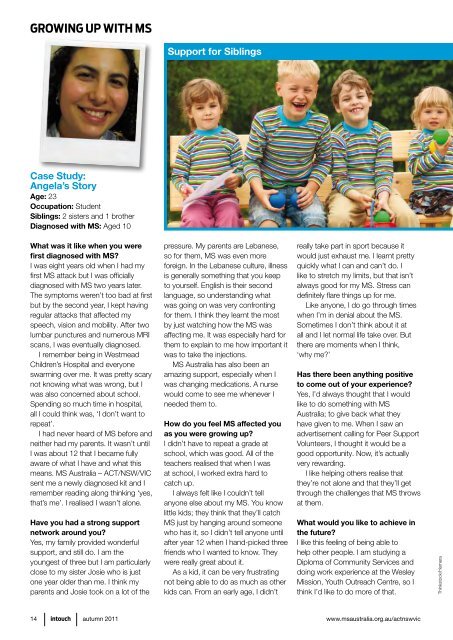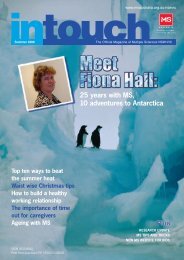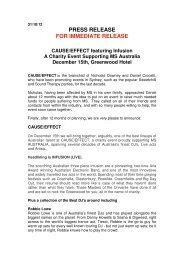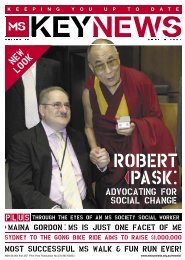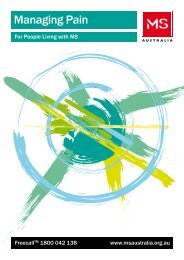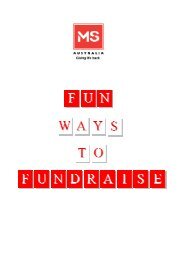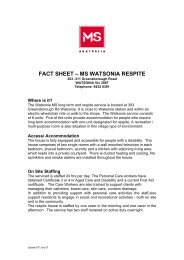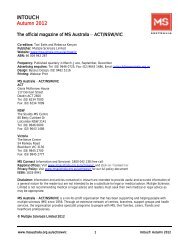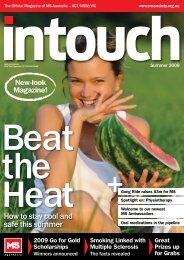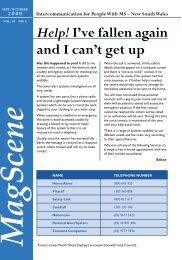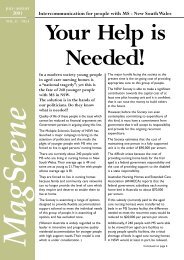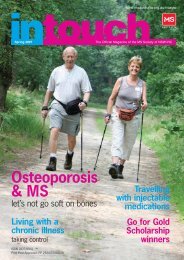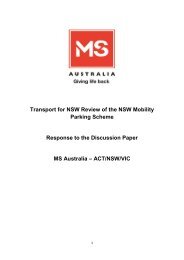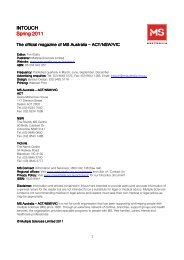Practical advice and personal stories from children ... - MS Australia
Practical advice and personal stories from children ... - MS Australia
Practical advice and personal stories from children ... - MS Australia
You also want an ePaper? Increase the reach of your titles
YUMPU automatically turns print PDFs into web optimized ePapers that Google loves.
GROWING UP WITH <strong>MS</strong><br />
Support for Siblings<br />
Case Study:<br />
Angela’s Story<br />
Age: 23<br />
Occupation: Student<br />
Siblings: 2 sisters <strong>and</strong> 1 brother<br />
Diagnosed with <strong>MS</strong>: Aged 10<br />
What was it like when you were<br />
first diagnosed with <strong>MS</strong>?<br />
I was eight years old when I had my<br />
first <strong>MS</strong> attack but I was officially<br />
diagnosed with <strong>MS</strong> two years later.<br />
The symptoms weren’t too bad at first<br />
but by the second year, I kept having<br />
regular attacks that affected my<br />
speech, vision <strong>and</strong> mobility. After two<br />
lumbar punctures <strong>and</strong> numerous MRI<br />
scans, I was eventually diagnosed.<br />
I remember being in Westmead<br />
Children’s Hospital <strong>and</strong> everyone<br />
swarming over me. It was pretty scary<br />
not knowing what was wrong, but I<br />
was also concerned about school.<br />
Spending so much time in hospital,<br />
all I could think was, ‘I don’t want to<br />
repeat’.<br />
I had never heard of <strong>MS</strong> before <strong>and</strong><br />
neither had my parents. It wasn’t until<br />
I was about 12 that I became fully<br />
aware of what I have <strong>and</strong> what this<br />
means. <strong>MS</strong> <strong>Australia</strong> – ACT/NSW/VIC<br />
sent me a newly diagnosed kit <strong>and</strong> I<br />
remember reading along thinking ‘yes,<br />
that’s me’. I realised I wasn’t alone.<br />
Have you had a strong support<br />
network around you?<br />
Yes, my family provided wonderful<br />
support, <strong>and</strong> still do. I am the<br />
youngest of three but I am particularly<br />
close to my sister Josie who is just<br />
one year older than me. I think my<br />
parents <strong>and</strong> Josie took on a lot of the<br />
pressure. My parents are Lebanese,<br />
so for them, <strong>MS</strong> was even more<br />
foreign. In the Lebanese culture, illness<br />
is generally something that you keep<br />
to yourself. English is their second<br />
language, so underst<strong>and</strong>ing what<br />
was going on was very confronting<br />
for them. I think they learnt the most<br />
by just watching how the <strong>MS</strong> was<br />
affecting me. It was especially hard for<br />
them to explain to me how important it<br />
was to take the injections.<br />
<strong>MS</strong> <strong>Australia</strong> has also been an<br />
amazing support, especially when I<br />
was changing medications. A nurse<br />
would come to see me whenever I<br />
needed them to.<br />
How do you feel <strong>MS</strong> affected you<br />
as you were growing up?<br />
I didn’t have to repeat a grade at<br />
school, which was good. All of the<br />
teachers realised that when I was<br />
at school, I worked extra hard to<br />
catch up.<br />
I always felt like I couldn’t tell<br />
anyone else about my <strong>MS</strong>. You know<br />
little kids; they think that they’ll catch<br />
<strong>MS</strong> just by hanging around someone<br />
who has it, so I didn’t tell anyone until<br />
after year 12 when I h<strong>and</strong>-picked three<br />
friends who I wanted to know. They<br />
were really great about it.<br />
As a kid, it can be very frustrating<br />
not being able to do as much as other<br />
kids can. From an early age, I didn’t<br />
really take part in sport because it<br />
would just exhaust me. I learnt pretty<br />
quickly what I can <strong>and</strong> can’t do. I<br />
like to stretch my limits, but that isn’t<br />
always good for my <strong>MS</strong>. Stress can<br />
definitely flare things up for me.<br />
Like anyone, I do go through times<br />
when I’m in denial about the <strong>MS</strong>.<br />
Sometimes I don’t think about it at<br />
all <strong>and</strong> I let normal life take over. But<br />
there are moments when I think,<br />
‘why me?’<br />
Has there been anything positive<br />
to come out of your experience?<br />
Yes, I’d always thought that I would<br />
like to do something with <strong>MS</strong><br />
<strong>Australia</strong>; to give back what they<br />
have given to me. When I saw an<br />
advertisement calling for Peer Support<br />
Volunteers, I thought it would be a<br />
good opportunity. Now, it’s actually<br />
very rewarding.<br />
I like helping others realise that<br />
they’re not alone <strong>and</strong> that they’ll get<br />
through the challenges that <strong>MS</strong> throws<br />
at them.<br />
What would you like to achieve in<br />
the future?<br />
I like this feeling of being able to<br />
help other people. I am studying a<br />
Diploma of Community Services <strong>and</strong><br />
doing work experience at the Wesley<br />
Mission, Youth Outreach Centre, so I<br />
think I’d like to do more of that.<br />
Thinkstock/Hemera<br />
14 intouch autumn 2011<br />
www.msaustralia.org.au/actnswvic


